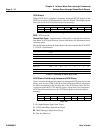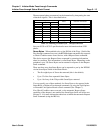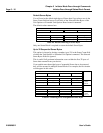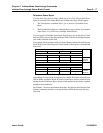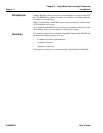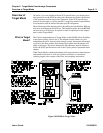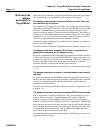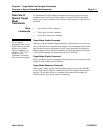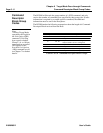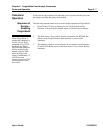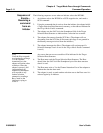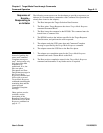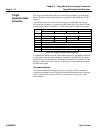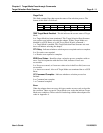
21020285 D User’s Guide
Chapter 6 Target Mode Pass-through Commands
Page 6 - 4 Overview of Target Mode
What must the
adapter
accomplish in
Target Mode?
There are special commands, setup rules and status involved with Target Mode
that are necessary to accomplish the work required of the adapter:
The adapter must provide a means to inform the Host that it has
been selected by an initiator.
Few responses of the adapter are automatic—most often it is the responsibility
of the Host to determine action after a selection of the RF3880 occurs over the
SCSI bus. Communication of a selection by an initiator is done via a data
structure created in memory (Target Selection Data Structure). The address of
the memory location that the adapter is to use, is part of the Enable Target Mode
command. As soon as it is selected, the adapter writes information about the
selection into the appropriate memory and interrupts the Host.
For more information about the Target Mode Enable command, see Chapter 7,
Board-control Commands.
For more information about the Target Selection Data Structure, see page 6 - 10.
The adapter must have a means for the Host to communicate
appropriate responses for the adapter to use.
By use of a command similar to the Initiator Pass-through commands, the Host
is able to tailor the type of response that the RF3880 (as target) will return. The
command is called Target Mode Response command. When this command is
received, the adapter reads and uses the data specified in the command
Parameter Block to respond to the initiator that selected it.
For more information about the Target Mode Response command, refer to page
6 - 15.
The adapter must have a means of communicating status back to
the Host.
As it does as an initiator, the RF3880 operating in Target Mode returns a Status
Block to the Host when an operation completes. Depending on the command
and how it completed, the Status Block returned may contain additional
information from the Initiator.
For more information about the Status Blocks returned in Target Mode, refer
to page 6 - 19.
The adapter must have a means of handling SCSI protocol issues.
The SCSI protocol is flexible in allowing a variety of negotiations to occur
between initiator and target. Tagged Queuing, wide and/or synchronous
transfers, response to other messages, and transmission errors all must be
handled according to the specification to allow for compatibility. The RF3880
passes message decisions to the Host for processing except: Initiator-detected
Error messages, and Message Parity error messages. The adapter handles wide
or synchronous transfer negotiation with an initiator and adapter-detected
parity errors without interaction with the Host.
For more information about the adapter handling of SCSI protocol details, see
Chapter 8, Details of Usage.



